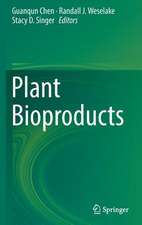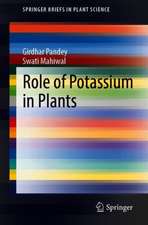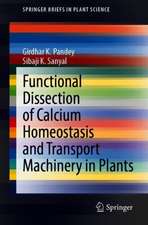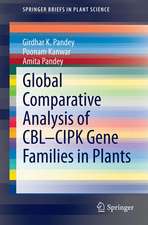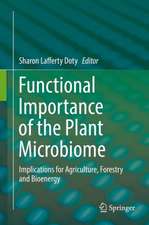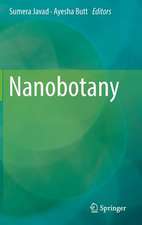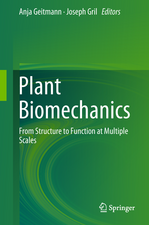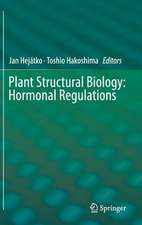Elucidation of Abiotic Stress Signaling in Plants: Functional Genomics Perspectives, Volume 1
Editat de Girdhar K. Pandeyen Limba Engleză Hardback – 30 mai 2015
| Toate formatele și edițiile | Preț | Express |
|---|---|---|
| Paperback (2) | 793.56 lei 38-44 zile | |
| Springer – 8 oct 2016 | 793.56 lei 38-44 zile | |
| Springer – 8 oct 2016 | 800.34 lei 38-44 zile | |
| Hardback (2) | 956.69 lei 43-57 zile | |
| Springer – 30 mai 2015 | 956.69 lei 43-57 zile | |
| Springer – 30 mai 2015 | 960.78 lei 43-57 zile |
Preț: 956.69 lei
Preț vechi: 1166.69 lei
-18% Nou
Puncte Express: 1435
Preț estimativ în valută:
183.12€ • 198.98$ • 153.92£
183.12€ • 198.98$ • 153.92£
Carte tipărită la comandă
Livrare economică 21 aprilie-05 mai
Preluare comenzi: 021 569.72.76
Specificații
ISBN-13: 9781493922109
ISBN-10: 1493922106
Pagini: 926
Ilustrații: XVIII, 404 p. 35 illus., 29 illus. in color.
Dimensiuni: 155 x 235 x 22 mm
Greutate: 0.77 kg
Ediția:2015
Editura: Springer
Colecția Springer
Locul publicării:New York, NY, United States
ISBN-10: 1493922106
Pagini: 926
Ilustrații: XVIII, 404 p. 35 illus., 29 illus. in color.
Dimensiuni: 155 x 235 x 22 mm
Greutate: 0.77 kg
Ediția:2015
Editura: Springer
Colecția Springer
Locul publicării:New York, NY, United States
Public țintă
ResearchCuprins
Towards understanding abiotic stress signaling in plants: convergence of genomics, transcriptomics, proteomics and metabolomics approaches.- Molecular approaches in deciphering abiotic stress signaling mechanisms in plants.- Investigation of plant abiotic stress tolerance by proteomics and phosphoproteomics.- Role of cation/proton exchangers in abiotic stress signaling and stress tolerance in plants.- Decrypting Calcium Signaling in Plants: The Kinase Way.- CBL-mediated calcium signaling pathways in higher plants.- Redox regulated mechanisms: Implications for enhancing plant stress tolerance and crop yield.- Role of Mitogen activated Protein Kinase Cascade in Combating Abiotic Stress in Plants.- Small and large G proteins in biotic and abiotic stress response.- ABA Receptors: Prospects for Enhancing Biotic and Abiotic Stress Tolerance of Crops.- Emerging Roles of Auxin in Abiotic Stress Responses.- Biotic and Abiotic Stress Signaling Mediated by Salicylic Acid.- Methylglyoxal, Triose phosphate isomerase and Glyoxalase pathway: Implications in abiotic stress and signaling in plants.- Plant immunophilins: A protein family with diverse functions beyond protein folding activity.- Role of Plant Mediator Complex in Stress Response.- Towards understanding the transcriptional control of abiotic stress tolerance mechanisms in food legumes.- Insights into the small RNA mediated networks in response to abiotic stress in plants.- The Role of Long Non-coding RNAs in abiotic stress tolerance in plants.- Molecular physiology of heat Stress Responses in Plants.- The Omics of cold stress responses in plants.- Drought stress responses and signal transduction in plants.- Physiological and molecular mechanisms of flooding tolerance in plants.- Salt Adaptation Mechanisms of Halophytes: Improvement of Salt Tolerance in Crop Plants.- UV-B Photoreceptors, their role in photosignaling, physiological responses and abiotic stress in plants.- Analysis of signaling pathways duringheavy metal toxicity: A functional genomic perspective.- Nitrogen and Stress.- Signaling pathways in eukaryotic stress, aging and senescence: Common and distinct pathways.- Designing climate smart future crops employing signal transduction components.- Abiotic Stress in Crops: Candidate Genes, Osmolytes, Polyamines and Biotechnological Intervention.- Abiotic stress tolerance and sustainable agriculture: A functional genomic perspective.
Notă biografică
Dr. Girdhar Pandey serves as Associate Professor for the Department of Plant Molecular Biology at the University of Delhi South Campus. Dr. Pandey has published and contributed to widely praised books on plant genetics and genomics, including GTPases: Versatile Regulators of Signal Transduction in Plants (Springer, 2015), Abiotic Stress Adaptation in Plants: Physiological, Molecular and Genomic Foundation (Springer, 2010), and Biotechnology in Sustainable Biodiversity and Food Security (Science Publishers, Inc., 2003).
Textul de pe ultima copertă
In this volume, several world leaders in plant biology provide insight into ‘Stress Signaling’ in plants with a special emphasis on functional genomics aspects. This book utilizes state-of-the-art research in the field of stress mediated signaling to develop a better and holistic understanding of stress perception, its transduction followed by the generation of response.
In spite of the advent of different approaches to devise strategies for developing stress tolerant crops towards multiple stress conditions in the field, the success in achieving this goal is still unsatisfactory. Stress tolerance is a very complex process-involving plethora of components starting from stress sensing to generation of final adaptive response. There are several factors, which act as nodes and hubs in the signaling pathways, also serving as master-control switches in regulating a myriad of stress signaling pathways by affecting diverse target genes or gene products to finally bring-about a stress tolerance response. Therefore, in-depth understanding of these master-control switches and key-components in signal transduction pathway will be highly beneficial for designing crop plants tolerant to multiple stresses in the field.
In spite of the advent of different approaches to devise strategies for developing stress tolerant crops towards multiple stress conditions in the field, the success in achieving this goal is still unsatisfactory. Stress tolerance is a very complex process-involving plethora of components starting from stress sensing to generation of final adaptive response. There are several factors, which act as nodes and hubs in the signaling pathways, also serving as master-control switches in regulating a myriad of stress signaling pathways by affecting diverse target genes or gene products to finally bring-about a stress tolerance response. Therefore, in-depth understanding of these master-control switches and key-components in signal transduction pathway will be highly beneficial for designing crop plants tolerant to multiple stresses in the field.
Caracteristici
First book to discuss plant signaling from a genetic perspective Diversified group of international contributors Latest research and discussion, previously unavailable in one source?

